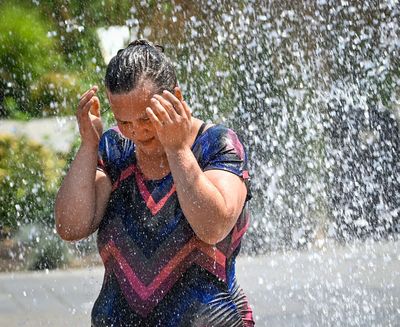Seniors and unhoused people are most at risk during heat wave

With the first day of this summer’s heat wave in Spokane’s rearview mirror, meteorologists predict the coming days may be slightly warmer than previously forecast, and local organizations are bracing to help the area’s most vulnerable groups stay safe.
Tuesday will bring a high of 105 degrees, according to the National Weather Service. Wednesday will follow with a 106-degree high, the service forecasts. Nightly lows will be 71 on Tuesday and 66 on Wednesday.
Though scorching, it’s not Spokane’s first heat wave rodeo with three-day stretches of triple-digit temperatures in 2021 and 2022 . Previously, the last heat wave of this magnitude was in 2006.
The city’s most recent heat wave was in 2022, when four consecutive days hit the triple-digit threshold at the end of July.
The year prior was deadly; 20 people in the county died in June 2021 when temperatures peaked at 109 degrees in a four-day stretch.
Most of those who died were older adults without adequate ways of cooling off in their homes. Four of the 20 were unhoused people, according to the county’s medical examiner’s annual report from that year.
Unhoused people and older adults are vulnerable populations during heat waves.
According to the U.S. Centers for Disease Control and Prevention, older people are more at risk in heat for a combination of reasons: their bodies don’t adjust to temperature extremes as well as those of younger people, they’re more likely to have medical conditions that affect how they acclimate to heat, and they’re also more likely to be on medications that interfere with body temperature or sweating.
The Spokane Fire Department gets calls regarding the welfare of unhoused people “exposed to the elements” during this type of weather, spokesperson Justin de Ruyter said.
Firefighters and paramedics sometimes spot people who appear to need assistance. They respond the same in heat events as they would in lower temperatures, evaluating all the same vitals, including consciousness and body temperature.
As needed, they ferry people to appropriate services to get out of the heat.
“Sometimes it’s just that they need to go to a cooling center and get water, sometimes it’s go to the hospital to get an IV,” de Ruyter said.
While the department most commonly addresses heat concerns among unhoused people, older people are also on the department’s radar. They perform wellness checks requested from loved ones. They check the environment of homes, looking for dishes in the sink to indicate they’re active and eating. They check home temperatures, and sometimes intervention is as simple as turning on air conditioning or adjusting fans. Responders evaluate their medical conditions, asking a series of questions to check for lucidity and confusion, a sign of heat exhaustion.
“That person will typically be talking to you, but there might be some confusion; usually with these people there’s just something off,” de Ruyter said.
Other signs of heat exhaustion include cool or pale skin, heavy sweating, vomiting, muscle cramps or dizziness.
Heat exhaustion is more common than heat stroke, de Ruyter said; often the former can lead to the latter and requires immediate attention. Someone with heat stroke may be unconscious or seizing.
“Heat exhaustion could lead to a severe emergency; heat stroke is a severe emergency,” he said.
Aware of the health risks excessive heat presents for seniors, Meals on Wheels Spokane delivers more than just 600 meals to its clients around the city. They also carry fans.
“Every summer, we do a fan drive, and it’s for situations just like this that we’re going through right now,” said Meals on Wheels Spokane spokesman Owen Esperas.
Current active clients of Meals on Wheels are eligible for a fan, Esperas said. Both the Spokane location on Second Avenue and the location serving Greater Spokane County have fans available for active clients. Fans are donated or purchased through the organization’s Amazon Wishlist.
Clients of the Spokane operation have requested more than 300 fans this year, Esperas said, and each senior who asked for one has received one so far.
Deliverers are aware of the dangers heat can pose to seniors’ health, especially homebound seniors like their clients.
Care managers from Meals on Wheels Spokane discovered seven older people dead in their homes after the heat wave in 2021 that killed 20 around the county.
The food delivery service has a process when days pass without seeing or hearing from one of its clients.
First, someone from the organization tries to contact seniors via phone. If the senior is continuously unreachable, care managers call their emergency contact and let them know the situation. They also call local hospitals to see if clients have been admitted.
Finally, they will perform a wellness check on their clients.
“Imagine if we didn’t have that process, when would they be found? And who would have found them?” Esperas said. “That’s one of the powers of Meals on Wheels; it’s more than a meal.”
Qualified seniors can apply to get delivered meals and two fans per household. There is no income qualification for Meals on Wheels, Esperas said; seniors need to be 60 years old, live within city limits and be homebound because of medical reasons, seasonal barriers like ice or snow, or transportation inhibitions.
Those eligible can apply by calling (509) 459-6597 or visiting the organization’s website at mowspokane.org for Spokane services or seek countywide delivery by calling (509) 924-6976 or visiting gscmealsonwheels.org.